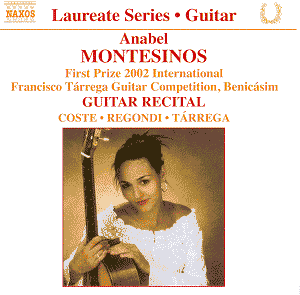The Guitarist Anabel Montesinos is, amazingly,
not yet 20. She was born in Spain in 1984 and has been raised
in the best traditions of Spanish guitar virtuosi, training at
the Conservatorio Superior de Música in Tarragona and currently
(2003) being still a student in the class of Ignacio Rodes at
the Conservatorio Superior de Música in Alicante. This
Naxos release is part of the offerings for her winning the first
prize in the famous International Francisco Tárrega Guitar
Competition in 2002. Allied to this achievement she took the audience
prize and the special prize for performance of works by Tárrega
at the same competition. She has also taken first prize at the
Castellón Francisco Tárrega competition 1999, The
Krynica International Competition in Poland 2000, The Sevilla
America Martinez National Contest, The Almeria Julian Arcas International
Contest, The International Guitar Festival in Moyen, France (all
in 2000) and The Jaén International Competition el Condado
and The Lérida Instrumental Competition Sant Anastasi in
2001. Normally this writer does not put much store by music competitions,
as they have a propensity for not comparing apples with apples.
However, the list mentioned above is worth repeating in full for,
like the proving of a scientific experiment by frequent repeats
to give authority to the conclusions, this number of first prizes
(the occasional second or third prize she has also won were not
even included) must carry weight as to the consistent quality
of her playing. It is a remarkable achievement.
Listening to the recording, it is clear that
none of these prizes were isolated occurrences. The playing is
of a precision and graceful flexibility that is normally associated
only with the very greatest guitarists. So frequently one hears
that slightly annoying aspect of squeaking left hand movement
over the strings. It could be argued as being an essential part
of the guitar experience, but frankly it is merely an annoying
distraction heard almost universally. Not here. Montesinos plays
with flair and undisguised virtuosity but the technical demands
are covered by what sounds like a flawless command of technique.
Her sound is beautiful in itself, but made the more so in that
we hear only her right hand at work. The left hand is a silent
manipulator of the strings. This technical command is impressive
in fast music but she does not let it become the reason for her
performance and this will be the crux of the distinction that
has given her so many prestigious prizes. In the competition world
technique is too often the be-all-and-end-all of performance.
Here it is undoubtedly impressive but is quite obviously appreciated
only as a support to the musical expression of the performance.
Of course, solo guitar repertoire is something
of a specialist area of listening and it cannot be argued that
all the music available, or indeed all the music recorded here,
is especially memorable. The repertoire relies heavily on salon
music of the late-18th and 19th centuries
and of the composers recorded on this disc only Francisco Tárrega
would be at all well known. This is not to say that there is not
interest in the music, but the majority of it falls into the ‘charming’
category rather than anything more profound. Still, that is the
repertoire of this instrument, and it is pleasing to note that,
for this first release, Montesinos has not tried to fall back
on transcriptions of piano or orchestral music. By avoiding such
repertoire she can at least claim an inherent integrity.
When it comes to the music of Francisco Tárrega,
it is immediately apparent why he is so revered amongst guitarists.
The three tracks of his works are instantly recognisable and are
imbued with that inner elegance, redolent of the hot wide expanses
of central Spain. The performances are crisp and intelligent,
underlined by the immaculate control mentioned above. While it
might remain one for the specialists, there is certainly much
to recommend to the general listener in this recording. The name
of Anabel Montesinos is one that we will certainly hear more in
the future.
Peter Wells
